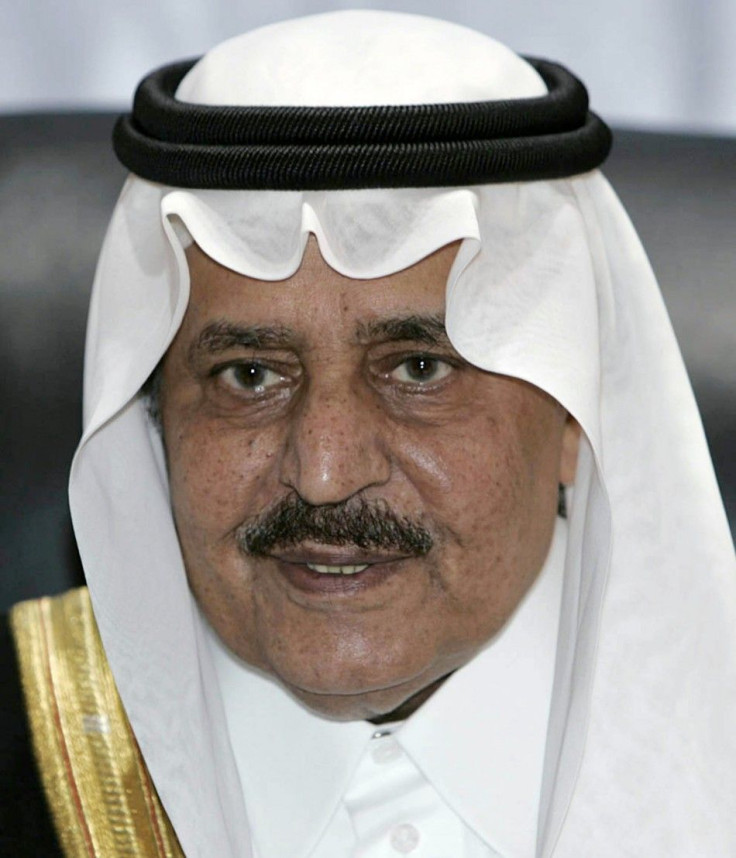Saudi King Abdullah Names Brother Nayef Crown Prince

Saudi Arabia's King Abdullah has appointed Interior Minister Prince Nayef as the new crown prince, the royal court said in a statement issued Friday, signaling an orderly process of future succession in the world's largest oil exporter.
We chose His Royal Highness Prince Nayef bin Abdulaziz as crown prince, said the statement, read on state television and carried on the kingdom's news agency SPA soon after midnight.
It said Nayef, who is in his 70s, was appointed after King Abdullah took his choice to a royal family body called the Allegiance Council, set up in 2006 to make the process of succession in the conservative Islamic nation smoother and more orderly.
It was the first time the council had been involved in the appointment of a new crown prince, a move that analysts had said would help to regulate an opaque system of succession.
Crown Prince Sultan died of colon cancer in New York almost a week ago. He was also the kingdom's defense and aviation minister for nearly five decades. No replacements for these positions have yet been appointed.
At stake is the stability of a key U.S. ally, whose ruling al-Saud family wields great influence over Sunni Muslims through its guardianship of Islam's holiest sites in Mecca and Medina.
Just over a century ago, King Abdulaziz Ibn Saud recaptured the family's historical stronghold of Riyadh from a rival clan, setting his family on a path of conquest from the Red Sea to the Gulf that eventually made the sleepy oasis town the capital of the world's foremost oil power.
As interior minister since 1975, a post to which he was reappointed in the Royal Court statement, Nayef has developed a reputation as a conservative with close ties to the Saudi religious establishment.
Nayef is sometimes portrayed as putting the brakes on the King Abdullah's cautious reforms which aim to reconcile the kingdom's conservative Islamic traditions with a youthful, increasingly outward looking population in the Middle East's largest economy.
Some 60 percent of Saudis are under the age of 30 and Internet penetration is 44 percent, according to internetworldstats.com.
DIFFERING VIEWS
Earlier this year Nayef publicly admonished a member of the mainly consultative Shura Council who had called for a review of the ban on women driving.
This means less for Saudi Arabia's external relations than it does internally because a lot of people there, especially women, are apprehensive that Nayef will close back down some of the space that Abdullah has opened up around individual citizens, said Thomas Lippman, a Saudi Arabia specialist at the Middle East Institute in Washington.
However, analysts and former diplomats in Saudi Arabia, the birthplace of Islam, say Crown Prince Nayef might show a different side to his character in his new position.
In recent years he has already run the kingdom on a day-to-day basis when King Abdullah and Prince Sultan were both absent. King Abdullah's recurrent back problem has caused him to go abroad for medical treatment.
Nayef, a half-brother of King Abdullah, was born around 1933 in Taif, the pretty mountain town where the royal court repaired each year to escape the stifling summer of the capital Riyadh and the second city Jeddah.
Saudi Arabia had only a year earlier come into being after Nayef's father King Abdulaziz Ibn Saud united the Bedouin tribes behind his vision of a pure Islamic state and conquered much of the Arabian Peninsula.
Growing up in the royal court of the 1930s and 1940s, Nayef is of the last generation of Saudis who knew the austere desert kingdom before the first flush of oil wealth changed it beyond all recognition.
As interior minister, Nayef led a successful effort to end a wave of al Qaeda attacks inside the kingdom from 2003.
Television footage on Saudi news channels Thursday showed some leading members of the al-Saud family receiving mourners for Crown Prince Sultan at the Yamama Palace in Riyadh.
One robed prince followed another in a sea of red and white headdresses, camel-hair cloaks and gold trim as members of the expansive royal family stepped forward to offer a brief embrace to the full brothers of Crown Prince Sultan.
His death has also opened up another vacancy at the top of government: the crucial role of defense minister in a country that uses multi-billion dollar arms purchases to make its military one of the best equipped in the Middle East and to cement ties with allies.
(Reporting By Angus McDowall; Editing by Kevin Liffey and Ralph Gowling)
© Copyright Thomson Reuters 2024. All rights reserved.





















